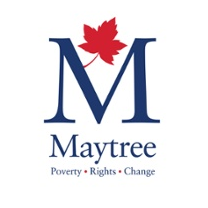 Poverty is what happens when people cannot access their human right to an adequate standard of living. They lack equitable access to housing, health care and pharmacare, education and training opportunities, or decent work. They experience food insecurity, poor sanitation and undrinkable water, or lack of income. Poverty is created by systems that affect people differently; as a result, Indigenous, Black, and racialized communities, women, and people with disabilities, for example, experience poverty at disproportionately high rates.
Poverty is what happens when people cannot access their human right to an adequate standard of living. They lack equitable access to housing, health care and pharmacare, education and training opportunities, or decent work. They experience food insecurity, poor sanitation and undrinkable water, or lack of income. Poverty is created by systems that affect people differently; as a result, Indigenous, Black, and racialized communities, women, and people with disabilities, for example, experience poverty at disproportionately high rates.
Poverty is the result of our society’s collective failure to fulfill the economic and social rights of every person in Canada. Fulfilling these human rights means ensuring that each person has the ability to live with dignity. To end poverty, we must aim to fulfill economic and social rights. A human rights-based approach will advance us towards this goal.
Taking a human rights-based approach is not an abstract ideal. It starts with a commitment to human rights principles. These include principles established in international human rights law, such as aiming for steady progress towards realizing human rights (also called “progressive realization”), prioritizing the people and groups most in need, and using as many resources as we can to advance human rights. It means providing justice or remedy for people whose rights are violated, and meaningful participation of the people who are most affected. It means making the impact on people’s lives the primary concern of decision-making.
A human rights-based approach takes these principles and turns them into effective policies and practices. For example, progressive realization means that you need to understand your current state, you need a way to measure the impact of your actions, and you need a feasible, fully resourced plan to progress towards your goal. This means collecting and analyzing data, setting targets and timelines, and having independent mechanisms in place to recommend how to improve. For each of the human rights principles, governments must take intentional action, and they must put sufficient resources behind those actions to make them effective.
We tend to think of human rights as a national issue. But people experience their economic and social rights at the local level – cities and towns are where we live, work, go to school, and get our groceries. Cities, therefore, have the opportunity to act as champions for our economic and social rights. While local governments cannot bear the duty of fulfilling human rights alone, they can – and must – act.
In cities across Canada, advocates in the community and in civil society have long called for better, lasting solutions to housing insecurity and homelessness – solutions grounded in the recognition of housing as a human right. The Right to Housing Coalition, for example, had done extensive work on legal challenges concerning violations of the human right to housing. Over many years, the coalition had built capacity and relationships both nationally and at the local level. When a window of opportunity opened, a vibrant network of housing advocates was ready to act locally. In 2019, the federal government passed the landmark National Housing Strategy Act, which recognizes housing as a human right for the first time in Canadian law. The City of Toronto, bolstered by this federal recognition, began a process of developing a housing charter and a ten-year housing plan. In response to these opportunities, the locally-focused Right to Housing Toronto network formed to engage with and support the municipality’s work.
In crafting the ten-year HousingTO Action Plan, the City, led by the Housing Secretariat and Deputy Mayor Ana Bailão, were open to the expertise that Right to Housing Toronto, community groups and advocates, and people with lived experience brought to the table. In its Housing Charter, the City enshrined the human right to housing, thereby committing to taking a human rights approach.
This is a work in progress; and with any new approach, the implementation is bound to encounter challenges. One major challenge has been to establish the structures and mechanisms needed to deliver on this human right. The City’s housing plan calls for a Housing Commissioner, which would hold the City to account for its progress on housing, as well as shepherd the housing plan into action. A strong, well-resourced office of the Housing Commissioner would focus exclusively on the work needed to be done on housing in Toronto. Yet, more than a year after the housing plan was adopted, the Housing Commissioner has not been established. The COVID-19 pandemic heightened what was already a housing and homelessness crisis in Toronto. To help mitigate this crisis, and to work towards strengthening housing systems in the long-term, Toronto must get an office of the Housing Commissioner up and running, without further delay.
In the absence of a Housing Commissioner, the City, again led by the Housing Secretariat and deputy mayor, has shown its openness to working with civil society in developing its housing policy. For example, the committee reviewing proposed changes to regulatory frameworks for multi-tenant houses (commonly called “rooming houses”) requested a human rights review of the proposed changes. This review is a good example of taking a methodical approach, by analyzing proposed changes against established dimensions of the human right to housing. It also demonstrates that using human rights as a guiding principle can be a useful tool for decision-making when trying to reconcile competing interests. The review process was very short, however, and did not include the participation of lived experts. In the future, this must be remedied by intentionally planning and budgeting for meaningful engagement of the people who are most affected by the policies being considered.
Toronto’s experience with the human right to housing is just one example of how local communities in Canada and around the world are acting on human rights, one that can be applied to other aspects of economic and social rights, such as income security.
As the experience in Toronto shows, a vibrant community sector, with expertise and relationships with the people they serve, is a vital factor in getting the ball rolling. So too is a local government open to working with community experts, to committing to advancing human rights, and to taking action using a human rights-based approach.
Poverty is a problem of human rights. By taking a human rights-based approach, local governments and communities can work together towards ending poverty and fulfilling the economic and social rights of every person in Canada.
This blog was originally published by Maytree on June 6, 2021
Further reading:
- Human rights cities: The power and potential of local government to advance economic and social rights
- A human rights review of Toronto’s multi-tenant homes policies
- The HousingTO 2020-2030 Action Plan will only be successful if it positively impacts the daily life of the most vulnerable people in Toronto
- Engaging lived and living expertise in COVID-19 recovery planning
- Right to Housing Toronto: Submissions to Toronto City Council
This article was written as a companion to Maytree’s workshop, “A human rights approach to ending poverty: A focus on housing,” presented on May 5, 2021, at The End of Poverty gathering organized by the Tamarack Institute.




